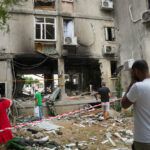Universitas Gadjah Mada is considering sending students for the Community Service Program (KKN) not only to various regions throughout Indonesia, but it is also possible to be sent to serve in other parts of the country such as in Namibia. This is because several UGM researchers have previously carried out community service activities in the country in the field of agriculture and fisheries development since 2008. This was raised in a Working Discussion organized by Commission II of the UGM Academic Senate (SA) entitled Community Service Flagship Policy , in the Multimedia room, UGM Central building, Friday (18/11). In this discussion, the Indonesian Ambassador to Namibia, Wisnu Edi Pratignyo, and UGM Agricultural Researcher, Dr. Taryono.
Chairman of Commission II SA UGM, Prof. Suratman, said that UGM has long experience in conducting community service activities by sending agricultural experts to Namibia. Moreover, UGM has a cooperation agreement with the University of Namibia (UNAM) in the field of developing rice varieties there. “I think it needs to be followed up with KKN activities in Namibia by sending students and DPL to a village in Namibia. Collaborating with the university of Namibia,” said Suratman.
Not only through community service activities, said Suratman, he also hopes that in the future a consortium will be formed with several universities in Namibia and Africa in the field of improving food security. “Our passion is saving the planet’s generation. Who else if not from the university, “he said.
The Chairperson of the Council of Professors (DGB), Prof. Moch Maksum, who was present at the discussion conveyed a similar sentiment, saying that he agreed that it was time for UGM KKN PPM to be brought to a global level. “So far KKN has been identified with domestic level service activities if we can contribute to the global world,” he said.
Apart from being able to contribute to global issues, according to him, this community service activity can be an added value for UGM in evaluating world-class university rankings. In the agricultural sector, according to him, UGM has experts who have experience in dryland and peatland studies which can later be used for practice in other countries such as Namibia.
The Indonesian Ambassador to Namibia, Wisnu Edi Pratignyo, said that there was a need to increase capacity building for the human resources of the Namibian community, especially in vocational education training in all fields. Apart from that, he also hopes that cooperation is needed by opening access to education for young Namibians to study at universities in Indonesia such as at UGM. “In addition to increasing capacity building, we also need to open access to education for young Namibians to get an education here,” he said.
UGM researcher and Head of the Agrotechnology Innovation Center (PIAT), Dr. Taryono, said that around 80 percent of Namibia’s food needs depend on food imports originating from South Africa. The UGM team’s visit since 2008 at that time was asked to improve the Namibia food security program. “They ask us to help reduce food dependence with South Africa. The dependency is huge. Because, the land of southern Namibia is desert, in the middle of the savanna only the northern part is green,” he said.
One of the things that was successfully carried out by collaborating with the University of Namibia, said Taryono, was the development of the Kalimbeza rice project. As told by Taryono, UGM was asked to help the university of Namibia support the success of the rice project in the Zambezi swamp area as a wallowing area for elephants, hippos and crocodiles sunbathing. “One day staying at the hut, waiting for five male elephants last night. Makes noise until I can’t sleep. I was also awaited by a hippopotamus,” he recalls.
According to Taryono, he went to Namibia with another research partner, Dr. Supriyanta who is known as a rice variety researcher at the UGM Faculty of Agriculture. The activities they carry out are mentoring and training for lecturers, students and farmers. The University of Namibia provides five hectares of land in the Ogongo area as a location for rice development learning media. “We also had time to teach students and farmers to learn to plant rice (stepping) backwards,” he recalled.
In addition to developing human resources in the agricultural sector, his party is also providing and adjusting rice facilities and infrastructure, as well as providing learning facilities on the Ogongo campus land. Then, in 2022, UGM will send experts to reactivation of the plant tissue culture laboratory at the University of Namibia.
Source : Universitas Gadjah Mada
















